- Home
- Elizabeth Gaskell
Cranford
Cranford Read online
PENGUIN BOOKS
Cranford
Elizabeth Cleghorn Gaskell was born in London in 1810, but spent her formative years in Cheshire, Stratford-upon-Avon and the north of England. In 1832 she married the Reverend William Gaskell, who became well known as the minister of the Unitarian Chapel in Manchester’s Cross Street. For sixteen years she bore children, worked amongst the poor, travelled and, latterly, began to write. In 1848, Mary Barton made her instantly a celebrity. In 1850, Dickens secured her to write for his magazine, Household Words, and she contributed fiction for the next thirteen years, notably Cranford and another industrial novel, North and South (1855). In 1850 she met Charlotte Brontë, who became a life-long friend. After Charlotte’s death she was chosen by Patrick Brontë to write The Life of Charlotte Brontë (1857), a controversial work. Her position as a clergyman’s wife and as a successful writer gave her a wide circle of friends both from the professional world of Manchester and from the larger literary world. There is nothing of the amateur about Elizabeth Gaskell. Her output was substantial and wholly professional. As Dickens discovered when he tried to impose his views on her as editor of Household Words, she was not to be bullied even by a man as imperious as he was. Her later works, Sylvia’s Lovers (1863), Cousin Phillis (1864) and Wives and Daughters (1866), show her developing in new directions. Elizabeth Gaskell died suddenly in November 1865.
ELIZABETH GASKELL
Cranford
and Cousin Phillis
PENGUIN BOOKS
PENGUIN BOOKS
Published by the Penguin Group
Penguin Books Ltd, 80 Strand, London WC2R 0RL, England
Penguin Group (USA) Inc., 375 Hudson Street, New York, New York 10014, USA
Penguin Group (Canada), 90 Eglinton Avenue East, Suite 700, Toronto, Ontario,
Canada M4P 2Y3 (a division of Pearson Penguin Canada Inc.)
Penguin Ireland, 25 St Stephen’s Green, Dublin 2, Ireland
(a division of Penguin Books Ltd)
Penguin Group (Australia), 250 Camberwell Road, Camberwell, Victoria 3124, Australia
(a division of Pearson Australia Group Pty Ltd)
Penguin Books India Pvt Ltd, 11 Community Centre, Panchsheel Park,
New Delhi – 110 017, India
Penguin Group (NZ), 67 Apollo Drive, Rosedale, North Shore 0632, New Zealand
(a division of Pearson New Zealand Ltd)
Penguin Books (South Africa) (Pty) Ltd, 24 Sturdee Avenue, Rosebank,
Johannesburg 2196, South Africa
Penguin Books Ltd, Registered Offices: 80 Strand, London WC2R 0RL, England
www.penguin.com
Cranford first published serialized in Household Words 1851–3
Cousin Phillis first published serialized in Cornhill Magazine 1863–4
Published in Red Classics 2009
Except in the United States of America, this book is sold subject to the condition that it shall not, by way of trade or otherwise, be lent, re-sold, hired out, or otherwise circulated without the publisher’s prior consent in any form of binding or cover other than that in which it is published and without a similar condition including this condition being imposed on the subsequent purchaser
ISBN: 978-0-14-193351-1
Contents
Cranford
I Our Society
II The Captain
III A Love Affair of Long Ago
IV A Visit to an Old Bachelor
V Old Letters
VI Poor Peter
VII Visiting
VIII ‘Your Ladyship’
IX Signor Brunoni
X The Panic
XI Samuel Brown
XII Engaged to be Married
XIII Stopped Payment
XIV Friends in Need
XV A Happy Return
XVI Peace to Cranford
Cousin Phillis
Part I
Part II
Part III
Part IV
Cranford
I
Our Society
In the first place, Cranford is in possession of the Amazons; all the holders of houses, above a certain rent, are women. If a married couple come to settle in the town, somehow the gentleman disappears; he is either fairly frightened to death by being the only man in the Cranford evening parties, or he is accounted for by being with his regiment, his ship, or closely engaged in business all the week in the great neighbouring commercial town of Drumble, distant only twenty miles on a railroad. In short, whatever does become of the gentlemen, they are not at Cranford. What could they do if they were there? The surgeon has his round of thirty miles, and sleeps at Cranford; but every man cannot be a surgeon. For keeping the trim gardens full of choice flowers without a weed to speck them; for frightening away little boys who look wistfully at the said flowers through the railings; for rushing out at the geese that occasionally venture into the gardens if the gates are left open; for deciding all questions of literature and politics without troubling themselves with unnecessary reasons or arguments; for obtaining clear and correct knowledge of everybody’s affairs in the parish; for keeping their neat maid-servants in admirable order; for kindness (somewhat dictatorial) to the poor, and real tender good offices to each other whenever they are in distress, the ladies of Cranford are quite sufficient. ‘A man,’ as one of them observed to me once, ‘is so in the way in the house!’ Although the ladies of Cranford know all each other’s proceedings; they are exceedingly indifferent to each other’s opinions. Indeed, as each has her own individuality, not to say eccentricity, pretty strongly developed, nothing is so easy as verbal retaliation; but somehow good-will reigns among them to a considerable degree.
The Cranford ladies have only an occasional little quarrel, spirted out in a few peppery words and angry jerks of the head; just enough to prevent the even tenor of their lives from becoming too flat. Their dress is very independent of fashion; as they observe, ‘What does it signify how we dress here at Cranford, where everybody knows us?’ And if they go from home, their reason is equally cogent: ‘What does it signify how we dress here, where nobody knows us?’ The materials of their clothes are, in general, good and plain, and most of them are nearly as scrupulous as Miss Tyler, of cleanly memory; but I will answer for it, the last gigot, the last tight and scanty petticoat in wear in England, was seen in Cranford – and seen without a smile.
I can testify to a magnificent family red silk umbrella, under which a gentle little spinster, left alone of many brothers and sisters, used to patter to church on rainy days. Have you any red silk umbrellas in London? We had a tradition of the first that had ever been seen in Cranford; and the little boys mobbed it, and called it ‘a stick in petticoats.’ It might have been the very red silk one I have described, held by a strong father over a troop of little ones; the poor little lady – the survivor of all – could scarcely carry it.
Then there were rules and regulations for visiting and calls; and they were announced to any young people, who might be staying in the town, with all the solemnity with which the old Manx laws were read once a year on the Tinwald Mount.
‘Our friends have sent to inquire how you are after your journey to-night, my dear’ (fifteen miles, in a gentlemen’s carriage); ‘they will give you some rest to-morrow, but the next day, I have no doubt, they will call; so be at liberty after twelve; – from twelve to three are our calling-hours.’
Then, after they had called,
‘It is the third day; I dare say your mamma has told you, my dear, never to let more than three days elapse between receiving a call and returning it; and also, that you are never to stay longer than a quarter of an hour.’
‘But am I to look at my watch? How am I to find out when a quarter of an hour has passed?’
&n
bsp; ‘You must keep thinking about the time, my dear, and not allow yourself to forget it in conversation.’
As everybody had this rule in their minds, whether they received or paid a call, of course no absorbing subject was ever spoken about. We kept ourselves to short sentences of small talk, and were punctual to our time.
I imagine that a few of the gentlefolks of Cranford were poor, and had some difficulty in making both ends meet; but they were like the Spartans, and concealed their smart under a smiling face. We none of us spoke of money, because that subject savoured of commerce and trade, and though some might be poor, we were all aristocratic. The Cranfordians had that kindly esprit de corps which made them overlook all deficiencies in success when some among them tried to conceal their poverty. When Mrs Forrester, for instance, gave a party in her baby-house of a dwelling, and the little maiden disturbed the ladies on the sofa by a request that she might get the tea-tray out from underneath, every one took this novel proceeding as the most natural thing in the world; and talked on about household forms and ceremonies, as if we all believed that our hostess had a regular servants’ hall, second table, with housekeeper and steward, instead of the one little charity-school maiden, whose short ruddy arms could never have been strong enough to carry the tray up-stairs, if she had not been assisted in private by her mistress, who now sat in state, pretending not to know what cakes were sent up, though she knew, and we knew, and she knew that we knew, and we knew that she knew we knew, she had been busy all the morning making tea-bread and sponge cakes.
There were one or two consequences arising from this general but unacknowledged poverty, and this very much acknowledged gentility, which were not amiss, and which might be introduced into many circles of society to their great improvement. For instance, the inhabitants of Cranford kept early hours, and clattered home in their pattens, under the guidance of a lantern-bearer, about nine o’clock at night; and the whole town was abed and asleep by half-past ten. Moreover, it was considered ‘vulgar’ (a tremendous word in Cranford) to give anything expensive, in the way of eatable or drinkable, at the evening entertainments. Wafer bread-and-butter and sponge-biscuits were all that the Honourable Mrs Jamieson gave; and she was sister-in-law to the late Earl of Glenmire, although she did practise such ‘elegant economy’.
‘Elegant economy!’ How naturally one falls back into the phraseology of Cranford! There, economy was always ‘elegant’, and money-spending always ‘vulgar and ostentatious’; a sort of sour grapeism, which made us very peaceful and satisfied. I never shall forget the dismay felt when a certain Captain Brown came to live at Cranford, and openly spoke about his being poor – not in a whisper to an intimate friend, the doors and windows being previously closed; but, in the public street! in a loud military voice! alleging his poverty as a reason for not taking a particular house. The ladies of Cranford were already rather moaning over the invasion of their territories by a man and a gentleman. He was a half-pay captain, and had obtained some situation on a neighbouring railroad, which had been vehemently petitioned against by the little town; and if, in addition to his masculine gender, and his connexion with the obnoxious railroad, he was so brazen as to talk of being poor – why! then, indeed, he must be sent to Coventry. Death was as true and as common as poverty; yet people never spoke about that, loud out in the streets. It was a word not to be mentioned to ears polite. We had tacitly agreed to ignore that any with whom we associated on terms of visiting equality could ever be prevented by poverty from doing anything that they wished. If we walked to or from a party, it was because the night was so fine, or the air so refreshing; not because sedan-chairs were expensive. If we wore prints, instead of summer silks, it was because we preferred a washing material; and so on, till we blinded ourselves to the vulgar fact, that we were, all of us, people of very moderate means. Of course, then, we did not know what to make of a man who could speak of poverty as if it was not a disgrace. Yet, somehow, Captain Brown made himself respected in Cranford, and was called upon in spite of all resolutions to the contrary. I was surprised to hear his opinions quoted as authority, at a visit which I paid to Cranford, about a year after he had settled in the town. My own friends had been among the bitterest opponents of any proposal to visit the captain and his daughters, only twelve months before; and now he was even admitted in the tabooed hours before twelve. True, it was to discover the cause of a smoking chimney, before the fire was lighted; but still Captain Brown walked up-stairs, nothing daunted, spoke in a voice too large for the room, and joked quite in the way of a tame man, about the house. He had been blind to all the small slights, and omissions of trivial ceremonies, with which he had been received. He had been friendly, though the Cranford ladies had been cool; he had answered small sarcastic compliments in good faith; and with his manly frankness had overpowered all the shrinking which met him as a man who was not ashamed to be poor. And, at last, his excellent masculine common sense, and his facility in devising expedients to overcome domestic dilemmas, had gained him an extraordinary place as authority among the Cranford ladies. He, himself, went on in his course, as unaware of his popularity as he had been of the reverse; and I am sure he was startled one day, when he found his advice so highly esteemed, as to make some counsel which he had given in jest, to be taken in sober, serious earnest.
It was on this subject; – an old lady had an Alderney cow, which she looked upon as a daughter. You could not pay the short quarter of an hour call, without being told of the wonderful milk or wonderful intelligence of this animal. The whole town knew and kindly regarded Miss Betty Barker’s Alderney; therefore great was the sympathy and regret when, in an unguarded moment, the poor cow tumbled into a lime-pit. She moaned so loudly that she was soon heard, and rescued; but meanwhile the poor beast had lost most of her hair and came out looking naked, cold, and miserable, in a bare skin. Everybody pitied the animal, though a few could not restrain their smiles at her droll appearance. Miss Betty Barker absolutely cried with sorrow and dismay; and it was said she thought of trying a bath of oil. This remedy, perhaps, was recommended by some one of the number whose advice she asked; but the proposal, if ever it was made, was knocked on the head by Captain Brown’s decided ‘Get her a flannel waistcoat and flannel drawers, ma’am, if you wish to keep her alive. But my advice is, kill the poor creature at once.’
Miss Betty Barker dried her eyes and thanked the captain heartily; she set to work, and by-and-by all the town turned out to see the Alderney meekly going to her pasture, clad in dark grey flannel. I have watched her myself many a time. Do you ever see cows dressed in grey flannel in London?
Captain Brown had taken a small house on the outskirts of the town, where he lived with his two daughters. He must have been upwards of sixty at the time of the first visit I paid to Cranford, after I had left it as a residence. But he had a wiry, well-trained, elastic figure; a stiff military throw-back of his head, and a springing step, which made him appear much younger than he was. His eldest daughter looked almost as old as himself, and betrayed the fact that his real, was more than his apparent, age. Miss Brown must have been forty; she had a sickly, pained, careworn expression on her face, and looked as if the gaiety of youth had long faded out of sight. Even when young she must have been plain and hard featured. Miss Jessie Brown was ten years younger than her sister, and twenty shades prettier. Her face was round and dimpled. Miss Jenkyns once said, in a passion against Captain Brown (the cause of which I will tell you presently), ‘that she thought it was time for Miss Jessie to leave off her dimples, and not always to be trying to look like a child.’ It was true there was something child-like in her face; and there will be, I think, till she dies, though she should live to a hundred. Her eyes were large blue wondering eyes, looking straight at you; her nose was unformed and snub, and her lips were red and dewy; she wore her hair, too, in little rows of curls, which heightened this appearance. I do not know whether she was pretty or not; but I liked her face, and so did everybody, and I do not think she could
help her dimples. She had something of her father’s jauntiness of gait and manner; and any female observer might detect a slight difference in the attire of the two sisters – that of Miss Jessie being about two pounds per annum more expensive than Miss Brown’s. Two pounds was a large sum in Captain Brown’s annual disbursements.
Such was the impression made upon me by the Brown family, when I first saw them all together in Cranford church. The captain I had met before – on the occasion of the smoky chimney, which he had cured by some simple alteration in the flue. In church, he held his double eye-glass to his eyes during the Morning Hymn, and then lifted up his head erect and sang out loud and joyfully. He made the responses louder than the clerk – an old man with a piping feeble voice, who, I think, felt aggrieved at the captain’s sonorous bass, and quavered higher and higher in consequence.
On coming out of church, the brisk captain paid the most gallant attention to his two daughters. He nodded and smiled to his acquaintances; but he shook hands with none until he had helped Miss Brown to unfurl her umbrella, had relieved her of her prayer-book, and had waited patiently till she, with trembling nervous hands, had taken up her gown to walk through the wet roads.
I wondered what the Cranford ladies did with Captain Brown at their parties. We had often rejoiced, in former days, that there was no gentleman to be attended to, and to find conversation for, at the card-parties. We had congratulated ourselves upon the snugness of the evenings; and, in our love for gentility, and distaste of mankind, we had almost persuaded ourselves that to be a man was to be ‘vulgar’; so that when I found my friend and hostess, Miss Jenkyns, was going to have a party in my honour, and that Captain and the Miss Browns were invited, I wondered much what would be the course of the evening. Card-tables, with green-baize tops, were set out by daylight, just as usual; it was the third week in November, so the evenings closed in about four. Candles, and clean packs of cards were arranged on each table. The fire was made up; the neat maid-servant had received her last directions; and there we stood dressed in our best, each with a candle-lighter in our hands, ready to dart at the candles as soon as the first knock came. Parties in Cranford were solemn festivities, making the ladies feel gravely elated, as they sat together in their best dresses. As soon as three had arrived, we sat down to ‘Preference’, I being the unlucky fourth. The next four comers were put down immediately to another table; and presently the tea-trays, which I had seen set out in the store-room as I passed in the morning, were placed each on the middle of a card-table. The china was delicate egg-shell; the old-fashioned silver glittered with polishing; but the eatables were of the slightest description. While the trays were yet on the tables, Captain and the Miss Browns came in; and I could see, that somehow or other the captain was a favourite with all the ladies present. Ruffled brows were smoothed, sharp voices lowered at his approach. Miss Brown looked ill, and depressed almost to gloom. Miss Jessie smiled as usual, and seemed nearly as popular as her father. He immediately and quietly assumed the man’s place in the room; attended to every one’s wants, lessened the pretty maid-servant’s labour by waiting on empty cups, and bread-and-butterless ladies; and yet did it all in so easy and dignified a manner, and so much as if it were a matter of course for the strong to attend to the weak, that he was a true man throughout. He played for three-penny points with as grave an interest as if they had been pounds; and yet, in all his attention to strangers, he had an eye on his suffering daughter; for suffering I was sure she was, though to many eyes she might only appear to be irritable. Miss Jessie could not play cards; but she talked to the sitters-out, who, before her coming, had been rather inclined to be cross. She sang, too, to an old cracked piano, which I think had been a spinnet in its youth. Miss Jessie sang ‘Jock of Hazeldean’ a little out of tune; but we were none of us musical, though Miss Jenkyns beat time, out of time, by way of appearing to be so.

 Lizzie Leigh
Lizzie Leigh The Poor Clare
The Poor Clare Lois the Witch
Lois the Witch North and South
North and South Sexton's Hero
Sexton's Hero My Lady Ludlow
My Lady Ludlow Uncle Peter
Uncle Peter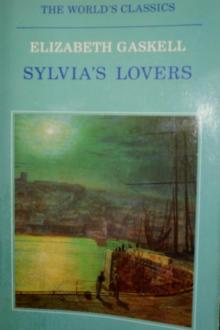 Sylvia's Lovers Elizabeth Cleghorn Gaskell
Sylvia's Lovers Elizabeth Cleghorn Gaskell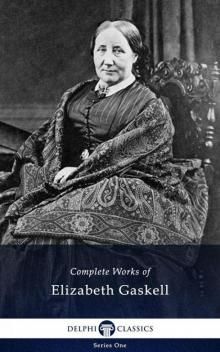 Delphi Complete Works of Elizabeth Gaskell
Delphi Complete Works of Elizabeth Gaskell The Grey Woman
The Grey Woman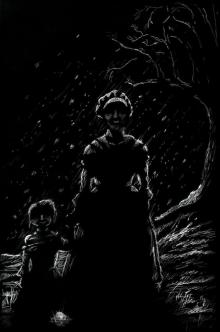 The Old Nurse's Story and Other Tales
The Old Nurse's Story and Other Tales Cranford
Cranford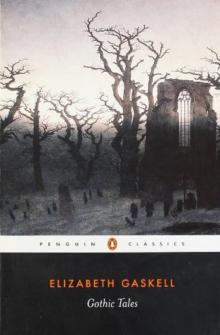 Gothic Tales
Gothic Tales Some Passages From the History of the Chomley Family
Some Passages From the History of the Chomley Family An Accursed Race
An Accursed Race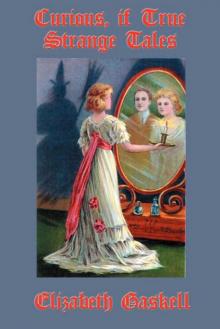 Curious, if True: Strange Tales Elizabeth Cleghorn Gaskell
Curious, if True: Strange Tales Elizabeth Cleghorn Gaskell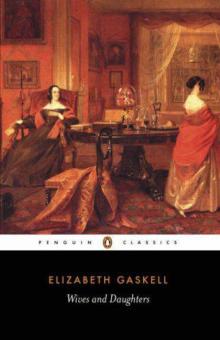 Wives and Daughters
Wives and Daughters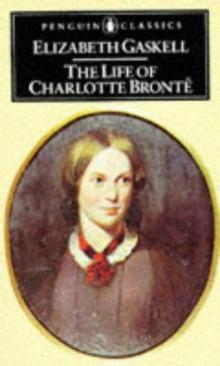 The life of Charlotte Brontë
The life of Charlotte Brontë